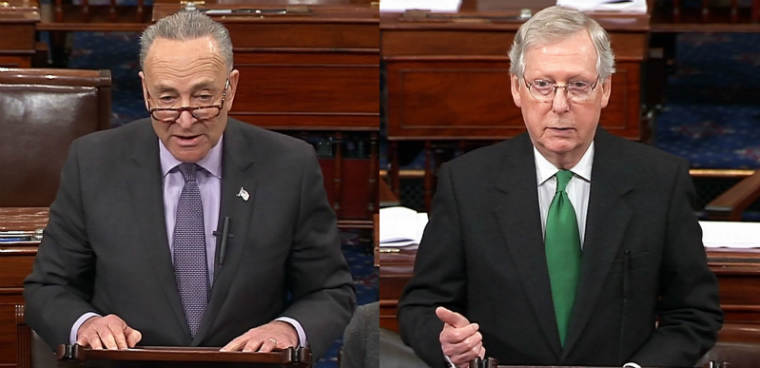Senate leaders strike two-year budget deal
Senate leaders struck a budget deal Feb. 7, paving the way for a spending bill to avert another shutdown.

Senate Minority Leader Chuck Schumer (D-N.Y.) and Senate Majority Leader Mitch McConnell (R-Ky.), shown here on C-SPAN, announced a two-year budget agreement that could help avert another shutdown. (Photos: C-SPAN)
Senate leaders struck a budget deal on Feb. 7, paving the way for a spending bill to avert another shutdown.
The two-year budget agreement busts the previous defense and civilian spending caps, which will reportedly raise federal spending by hundreds of billions of dollars through fiscal year 2019.
For fiscal year 2018, the deal would raise defense spending cap by roughly $80 billion, and the civilian cap by $63 billion. The deal also includes supplemental disaster relief for Puerto Rico, the Virgin Islands and states hit with wildfires and hurricanes. It provides another $6 billion to help fund opioid and mental health crises, and authorizes the Children’s Health Insurance Program for 10 years.
"No one would suggest it is perfect, but we worked hard to find common ground," Senate Majority Leader Mitch McConnell (R-Ky.) said.
Senate Minority Leader Chuck Schumer (D-N.Y.) said there are still “a few final details to work out,” but called the agreement “a genuine breakthrough.”
“The budget deal doesn’t have everything Democrats want, it doesn’t have everything the Republicans want, but it has a great deal of what the American people want,” he said. “This budget deal is the first real sprout of bipartisanship.”
- David Cox, President of the American Federation of Government Employees, the largest federal employee union, also backed the budget agreement, and urged Congress to pass the deal and avoid a shutdown.
“The budget would provide long-overdue increases for both our military and non-defense agencies,” he said in a statement. “Most federal agencies have been limping by on borrowed time for far too long due to harmful sequestration cuts. This budget will give agencies much-needed resources to invest in the programs and services that the public expects and deserves.”
However, the details for actual appropriations still need to be written. One notable tech provision would be funding for the Modernizing Government Technology Act, for which the White House has offered support and begun planning.
Another potential hang-up is that House Minority Leader Nancy Pelosi (D-Calif.) has said her support for the budget deal is contingent on a DACA vote.
“This morning, we took a measure of our caucus because the package does nothing to advance bipartisan legislation to protect dreamers in the House,” she said. “Without a commitment from Speaker [Paul Ryan (R-Wis.)] comparable to the commitment from Leader McConnell, this package does not have my support.”
At a White House event Feb. 6, President Donald Trump said he would “love to see a shutdown” if Congress did not address stricter immigration policies and funding for the wall.
“Without borders we don't have a country,” he said. “If we have to shut it down because the Democrats don’t want safety... let’s shut it down.”
While Ryan has not made such a commitment, he touted the bill’s inclusion of disaster relief and Republican priorities — namely, increased defense spending and Medicare reform.
Defense Secretary James Mattis said he was “heartened” by the agreement, and urged Congress to move ahead with passing the budget.
White House Press Secretary Sarah Huckabee Sanders said at a Feb. 7 press conference the deal achieves the White House’s “top priority” of increasing defense spending.
Asked if the president would sign the Senate’s agreement, she responded, “look, we applaud the steps forward that they’ve made, but we’re going to need to see what is in the final bill.”
At a Feb. 6 hearing of the Senate Homeland Security and Governmental Affairs Committee's Federal Spending Oversight and Emergency Management Subcommittee, senators on both sides of the aisle pointed the finger at Congress for the near-annual cycle of budget uncertainty.
Sen. Gary Peters (D-Mich.) said the “broken process” of continuing resolutions and shutdown brinksmanship shows Congress is failing at “our most basic job.”
Sen. Rand Paul (R-Ky.) lamented the consequences of what he called the “dysfunctional” budget process that lead to a host of management challenges, like delays in commencing planned projects, contracts, grants and workforce hiring.





